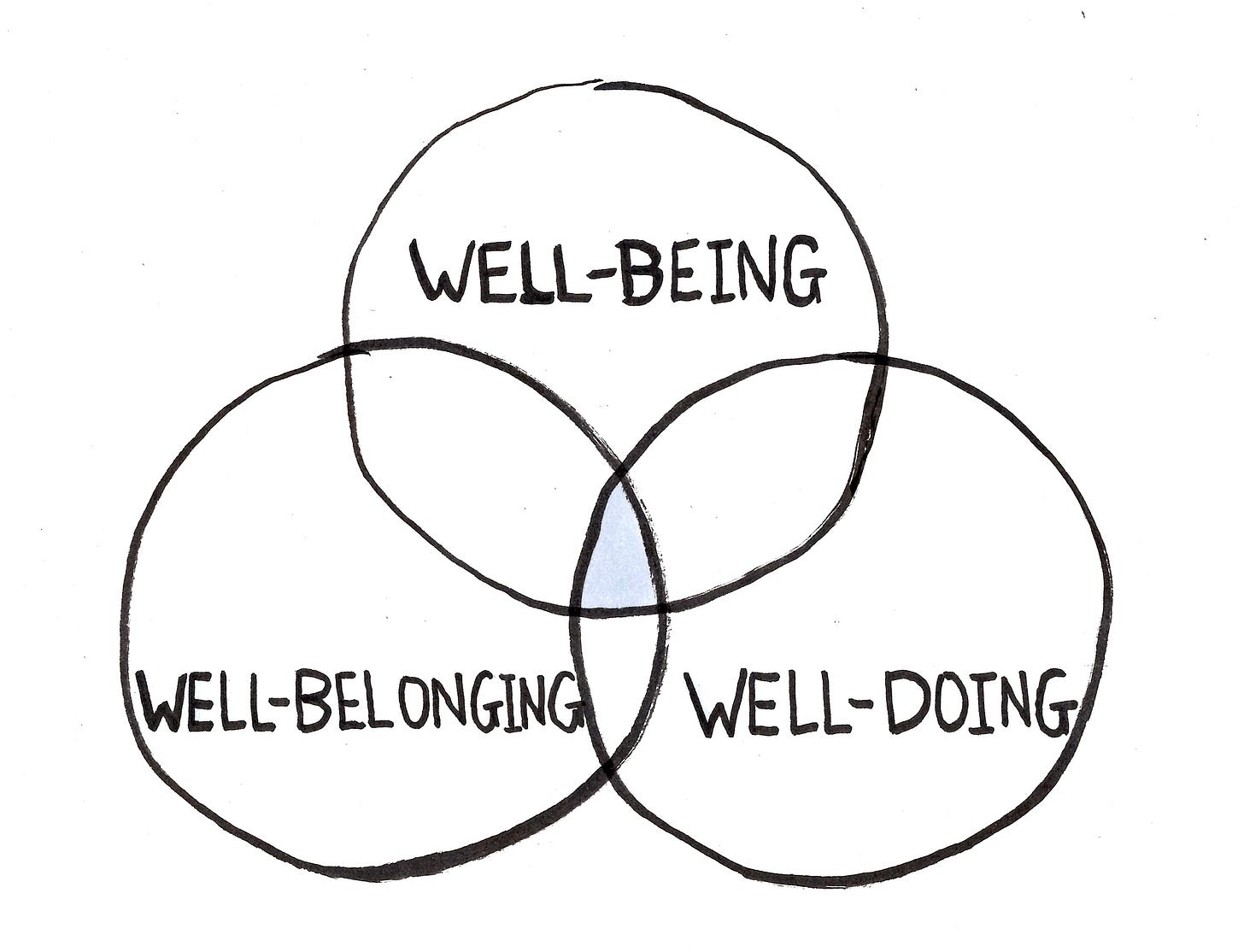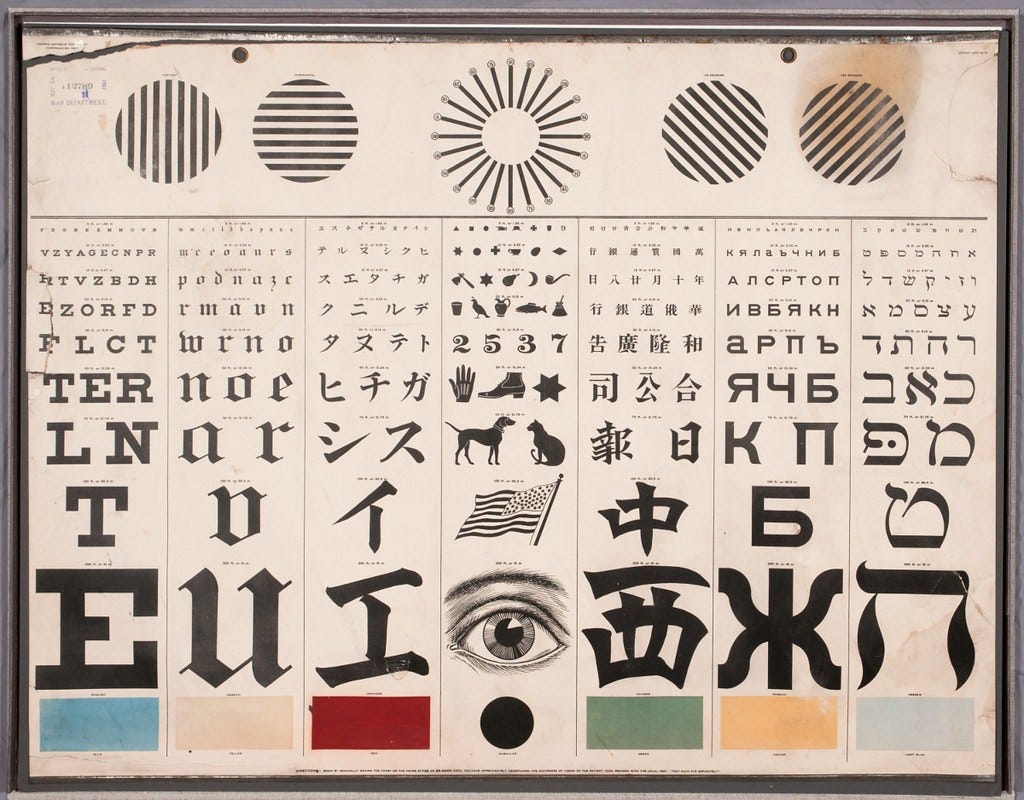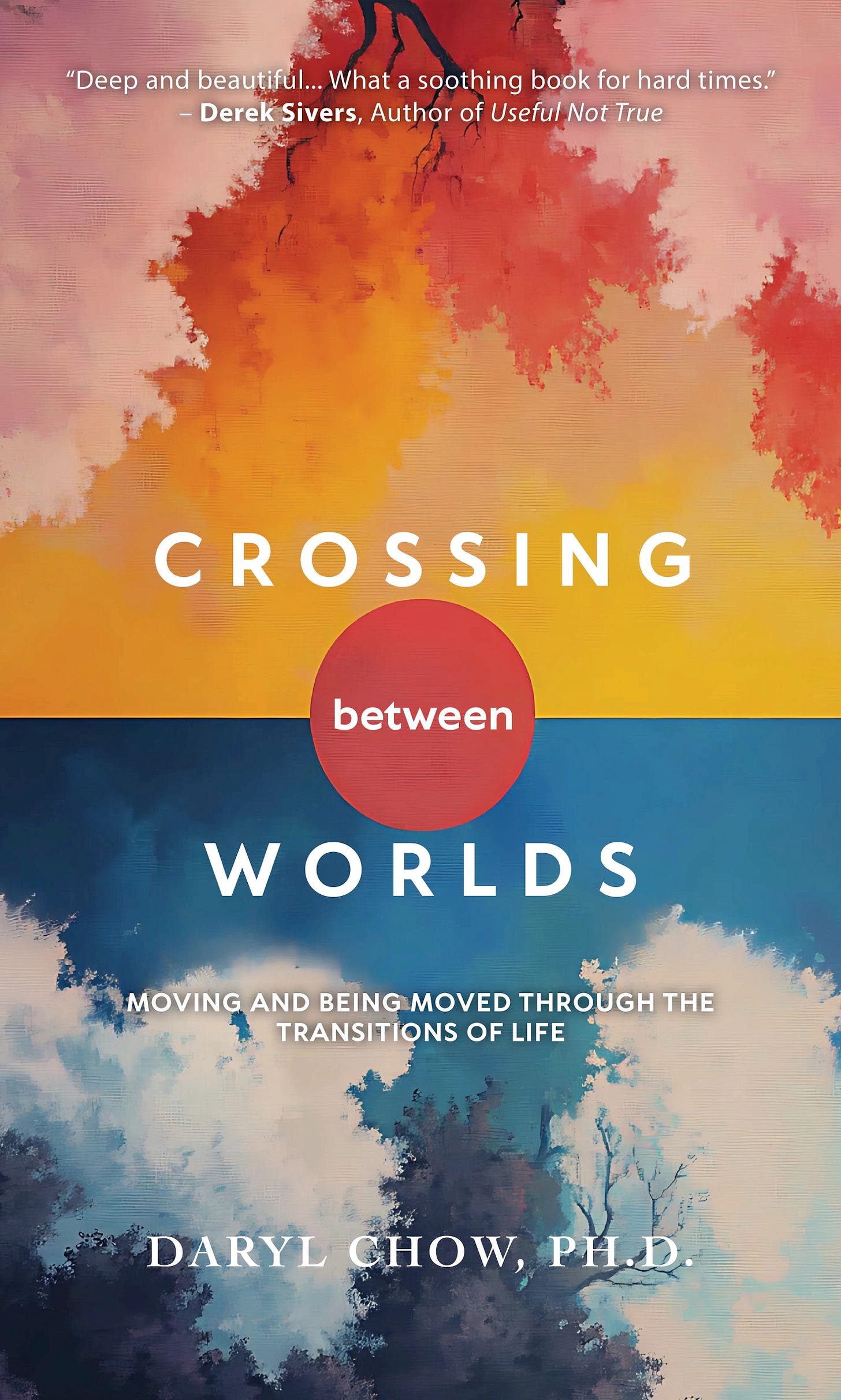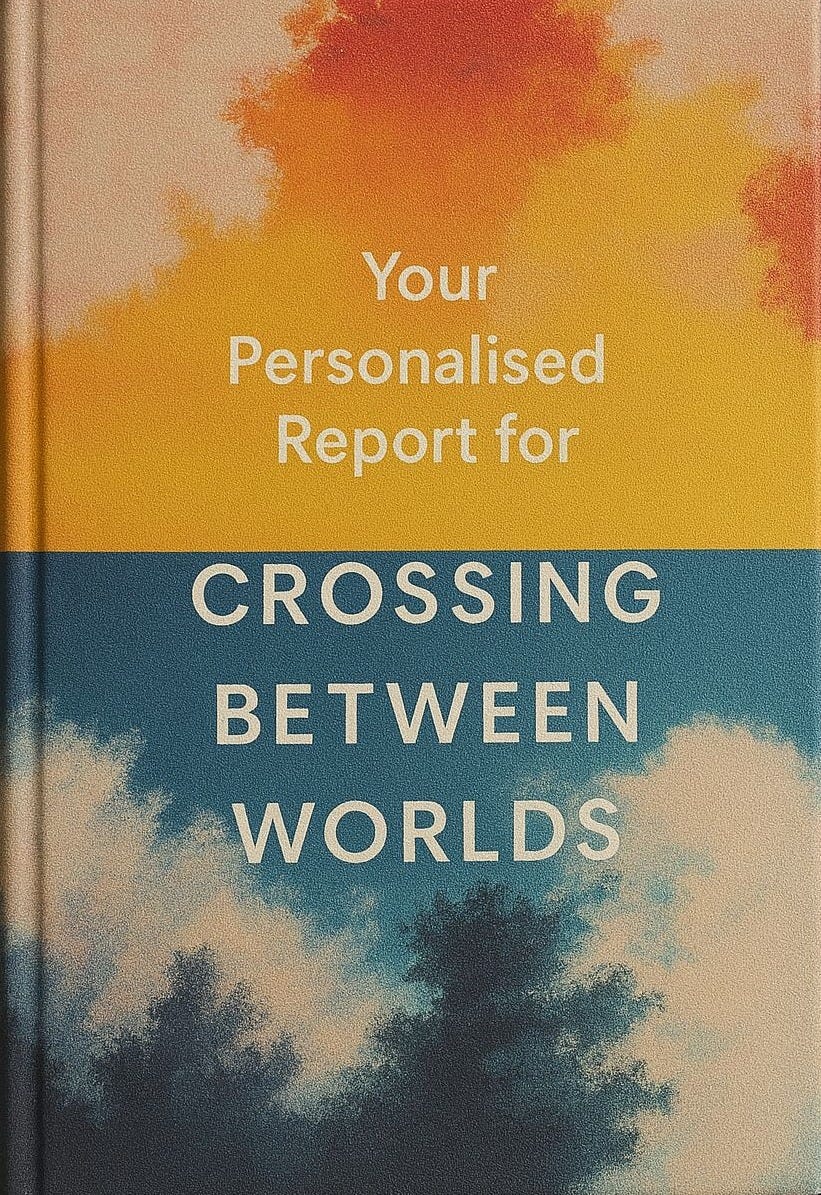How to Begin Crossing Between Worlds
Well-intended advice may have unintended consequences. Don't follow someone else's path. It's possible to find your own path.
So far, we’ve laid some foundations about what it takes to make significant life transitions:
In this article, you are going to take a step further, using the 15 Paradoxes that I’ve outlined in the book Crossing Between Worlds.
How to Begin
We want clear-cut answers.
But when someone doesn’t know you, well-intended advice may have unintended consequences. This book doesn’t tell you what to do, but it will offer you road signs on this inner landscape. Fifteen of them in fact. You get to decide which path to take, based on the season of your life that you are in.
This is tricky business, because we are dealing with what’s invisible. Yet, as Antoine de Saint-Exupéry said in The Little Prince,
“What’s essential is invisible to the eye.”
Proceed to the next section to get started.
What Is the Current Season of Your Life?
Take a moment to answer the following question: What would you call this season of your life?
Reflect on this. Examine not only the events surrounding your life of late, but also look inward. How have you been feeling? What has been on your mind? Your response to this can take the form of a word or a sentence, a direct reference to the four seasons, or even a drawing. Feel free to use the space below to write it down, or turn to your notebook. I recommend that you date it.
THE CURRENT SEASON OF MY LIFE IS:
_________________________________________________________
Instructions to Personal Paradoxical Profile (P3)
Now that you’ve done the “Season of Your Life” exercise, keep your answer to it in mind as you complete the P3. Here are the instructions:
1. Recall the last two weeks of your life. Review your calendar to see what took place and how you felt in those times.
2. There are 15 items across three domains: self (Well-Being), relations (Well-Belonging), and actions (Well-Doing).
3. In the following page, a summary of the P3 is provided. Mark a ‘>’ , ‘<’ or ‘X’ on each of the 15 lines.
4. Where you demarcate on the line is based on where you are now, and the symbol you use will depend on where you need to go. Each of these three symbols represent a marking of your current situation and the direction you need to take (i.e., > means you feel a need to move more to the right; < means you feel a need to move more to the left; x means you feel a need to maintain where you are at).
5. For example, for the first item, Self-Care/Self-Forgetting, if you feel more compelled to attend to your needs as you’ve been neglecting them, mark a ‘<’ more towards the right.
Self-Care<—————————<——> Self-Forgetting
6. If you feel that you have a good level of self-care and you need to focus more on others around you, mark a ‘>’ more towards the left.
Self-Care<——>—————————> Self-Forgetting
7. If you feel you need to have a good balance in this spectrum, mark an ‘X’ wherever is appropriate on this line. This could be either in the middle, if you feel you have a good balance of both, or, if you sense that in this season of your life you need to be more on the Self-Care end of things on the left. In other words, ‘X’ represents a match between where you are and where you feel you need to be.
Self-Care<————x————————> Self-Forgetting
8. After marking each of the 15 lines, read each Paradox in order to make sense of your needs at this stage of your life.
9. At the end of each Paradox, each of the spectrums are presented again for easy reference. Feel free to modify your response as you proceed with the book.
Finally, complete the P3 profile.
Make sure you set aside an hour in about a month’s time to review what you’ve planned out to do.
For some, you might find it challenging to complete the P3. Go easy on yourself. As mentioned in the instructions, each of the 15 lines that you demarcate on represents not only where you are, but also where you need to go. You might not be clear what each of the descriptions means, especially if you are doing the P3 for the first time. Feel free to pause and read the relevant Paradoxes to get an idea first.
Note: The P3 is not designed to be a psychometric tool. It is meant to be an individualised tool to help you navigate direction as you are making changes in your life.
Your Personal Paradoxical Profile (P3)
An Overview of the 15 Paradoxes: To help you with the initial completion of your P3, Here is a quick overview of each of the 15 paradoxes that we will be addressing in the book:

WELL-BEING
The person who is a constant outpouring of love for others needs to attend to their own neglect, while the person who is overly focused on the self needs to focus more on others.
Someone who defers life to the future needs to relish in the present moment, and the one who is wholly absorbed in the “now” needs to cast their eyes on the future, because they have no idea what’s for tomorrow.
The inward gaze of introspection is helpful for those who do not take the time to reflect on where life has been instead of where it’s going. But an overdose of introspection is like driving with your eyes glued to the rearview mirror.
Solitude is necessary for hearing ourselves clearly. Yet we can truly grow only in the company of others.
Sometimes we say Yes to the things we want to say No to. Other times, we say No too quickly and close ourselves to the world of possibilities that lie ahead of us.
WELL-BELONGING
Change happens when we embrace life with full acceptance. Brute-forcing change can cause harm. Yet a fear of change denies our instinct for growth.
There are seasons where we need to retreat from the world in order to appreciate the reality we live in, and there are seasons where we are called to approach what we fear.
In order to become our own person, we have to learn to belong. In order to be together, we need to learn to be by ourselves.
Caregiving can be second nature to some. For others, receiving care can be a foreign experience. And some would benefit immensely from the gift of being allowed to care for others.
We are called to be practitioners of love and grief. In this time-limited mortal arrangement, if we deny invitations to grieve and do not learn how to love, we might cause grief to others and ourselves.
WELL-DOING
At the beginning, if you aim for quality, you’ll miss the mark. Aim for quantity, and you are more likely to get quality. At the later stages of any development, take the opposite approach.
We think stress is the issue. But stress is not the problem; a lack of recovery is. In fact, some of us might need to embrace stress in order to stretch ourselves.
Stillness is required to see things clearly, while movement is required in order to reach what’s ahead of you.
It is easy to get stuck on “feeding” yourself with inputs without taking the risk of putting out your creations. No one is going to take care of the quality of your inputs except you.
There are many things that we can do to regain a sense of agency in our personal and professional lives. At the same time, modernity tends to over-glorify people with a sense of control and under-value people who know how to surrender.
More About Your Personal Paradoxical Profile
Now that you have an overview of the P3, there are a couple more things to say about your P3.
Your P3 is…
Contextual
Counterintuitive
Contradictory over time
Personal
Contextual
Trying to achieve something in a decontextualised manner is like improving your conversational English when you are visiting France. You’re spending your energy on the wrong language. This is why your P3 is context-bound by the current seasonality of your life, what it asks of you, where you need to be heading, and where you need to grow.
Counterintuitive
As highlighted in the previous section, “Why Paradoxical,” many of the tasks ahead of you might seem counterintuitive at first, since learning to go at your leading edge might involve counterintuitive actions that challenge your expectations. However, after you have a handle on the principles behind this book, you’ll realise that much of what is described here is common sense, just not common practice.
Contradictory Over Time
You’ll find that your present and future needs become contradictory to what you needed in the past.
One example is the process of moving from singlehood, to being part of a couple, and then eventually becoming a parent. Not only will your needs evolve, the expansion of your world moves you to expand your sense of self beyond the individual. The Self now encompasses a much larger community of others in your life. And later on, given the trajectories of family development, a different set of needs, actions, and emotional growth is required as your children leave home, moving towards their own frontiers.
Thus, the use of the P3 is not a one-time application. It is repeatedly helpful to get your bearings when you experience significant transitions.
Personal
Finally, this book faces a paradox: Though our foundational needs are the same, what’s most universal is personal, as each of us requires different things at different times. There is a certain sense of particularity in our endeavour that cannot be prescribed as a general course of action that we all must take. Thus, a “formula” will not work. When we can take that journey towards what speaks to each of us, we can then come together in our diversity. As the late Rabbi Jonathan Sacks puts it in his book, The Dignity of Difference, “Our particularity is our window on to universality.”1
The ethics of embracing each other’s differences is easy to state, but hard to do. Just take a look at the world around us to see how this has played out in the history of our civilisation. Sacks points out the Hebrew Bible’s counterintuitive contribution to ethics: “God creates differences; therefore it is in one-who-is-different that we meet God.”i Imagine if we were to encounter each other with that level of reverence, especially those who are different from us. Maybe one of the channels towards unity in our diverse society is to encounter and embrace our paradoxical selfs within.
Taken from Crossing Between Worlds, attached below is a full A4 print of the Personalised Paradoxical Profile (P3) that you can use.
What Not to Do When Crossing Between Worlds
Before we go down the rabbit hole of each of the 15 Paradoxes of this book, let me just spell out what you shouldn’t be doing when you are making significant transitions or at a crossroads:

Mistake #1. Acting on impulse
I know you know this, but some of us are more prone to impulsivity than others.
Hold your horses. It’s hard to see when you are travelling at the speed of impulse. You see the same street very differently when you are walking through it compared to when you are driving in your sedan.
Mistake #2. Following someone else’s advice
Some advice can be a vice.2 No matter how well-meaning they are, we can’t outsource our decision-making process to someone else.
Mistake #3. Following someone else’s desire
Who in their right mind would follow the desire of another person instead of their own? Turns out, we are all susceptible to what French philosopher René Girard calls mimetic desires. Individuals often end up desiring things because they see others desiring them, not because of any intrinsic value or personal preference. We end up wanting what others want.3
Mimetic desires are pulled by the need of status. It’s not just about cars; it’s more about our identity.
Maybe you are leaving a job to launch a startup that’s for a good cause. This is laudable. But be brutally honest with yourself. What’s behind your motivation? Is it really the common good, or is it more so you can say that you are doing something for a good cause because two of your close buddies are also doing something in that space? (See #2. Your Desires—Or is it Mimetic Desires? In Paradox 8, Autonomy, CBW book).
You are in a bad way if you succeed at something that is not your desire.
Mistake #4. Numbing yourself
When you are at the crossroads, it’s so much easier to numb yourself with Netflix and the infinite scroll of Instagram and TikTok than it is to make a real choice.
Do not anaesthetise yourself during this important period of your life. Don’t flood yourself with junk. Nourish yourself (see #1. The Dailies, Strategies, Skills, Meal (DSSM) Framework, in Paradox 6. Change, CBW book), and learn to feel what you feel, and not “fill” yourself with distraction.
As you are Crossing Between Worlds, your internal compass will serve you more than the external noise that fractures your attention and intentions.
Mistake #5. Focusing on the how and not the what
It’s easy to fixate on the “How-tos” by learning all sorts of strategies and tactics to sort your life out.
But first, before obsessing over the how-tos, focus on What is most essential.
Don’t mistake being busy with being productive.
Figuring out the What not only gives you leverage, but more importantly, it helps you set your directionality and shape your priority before proceeding.
For many, this will entail periods of self-reflection. I hope to walk you through the process.
Mistake #6. Isolating yourself
Our minds need another mind to function well. No other vital organ needs the vital organ of another person in order to survive,4 but our minds are fundamentally shaped by other minds. If our mind is not stimulated by the engagement of another mind, we atrophy.
Gregory Bateson quipped,
“It takes two to know one.”
This is especially true when you are Crossing Between Worlds.
Sure, you are going to need time to retreat and clarify your own thoughts (see Paradox 7. Retreat, in CBW book). But don’t dig yourself a hole, because you are going to need to tap into the minds of others through conversation, brainstorming, teaching, and learning and reading to sharpen your own thinking.
Mistake #7. Assuming that there is only one right way
One of the things in the cards when I got married was to move to another country. I’d felt like I’d managed to con a university into giving me a full scholarship to do my doctorate (I had never done well in my early schooling years). So I was thinking I’d get married and then go back to school in another country. I was so worried that I was doing something that was purely for selfish reasons. This would impact not only my life, but that of whoever was crazy enough to marry me, we'd be living a life of student’s subsistence for three years.5
I disclosed my dilemma to a mentor and friend, a former zookeeper turned Redemptorist priest, Glenn de Cruz, C.S.s.R.. He listened closely as I rambled on about my plans and fears of not going where God and Life were calling me to be. “Am I following the right path?” I asked him.
Glenn looked at me. “So your wife-to-be, she’s happy with the idea of moving to another country?”
“She’s more adventurous than I am. She’s game-on,” I said.
Glenn smiled. “Daryl, there isn’t ‘the one’ choice that you have to make. He will go with you, wherever you go, since you seek Him.”
You don’t have to be religious to make sense of his statement. I have to tell you, Glenn’s counsel left me both embarrassed and relieved by a simple suggestion I’d overlooked. I was fixated about there being only the one, right choice.
There are many roads open to you. Don’t think that there’s only a single “right” path to take.
Now, with your P3 completed at hand, let’s choose your own adventure.
Crossing Between Worlds is now available in all good bookstores.
P/S: Complete a short quiz to get a comprehensive How-To guide, to help you make significant life transitions and changes.
Thanks for reading Full Circles: Meditations on the Inner and Outer Life. Subscribe for free to receive new posts and support my work.
Daryl Chow Ph.D. is the author of The First Kiss, co-author of Better Results, and The Write to Recovery, Creating Impact, The Field Guide to Better Results, and the latest book, Crossing Between Worlds.
If you are a helping professional, you might like my other Substack, Frontiers of Psychotherapist Development (FPD).
The Dignity of Difference by Jonathan Sacks, pp. 56-57. Through written in 2003, this is a critical and prescient book for our times.
I’ve borrowed this analogy from Alok Kanojia, a.k.a. Dr. K.
Our student visa limited both of us to work at most part time during this period.



























Thanks to all who wrote in expressing your interest in the book (as well as your heartfelt messages)!
Most of the copies are sent, and the audiobook and ebooks should also be in your Inbox by now :)